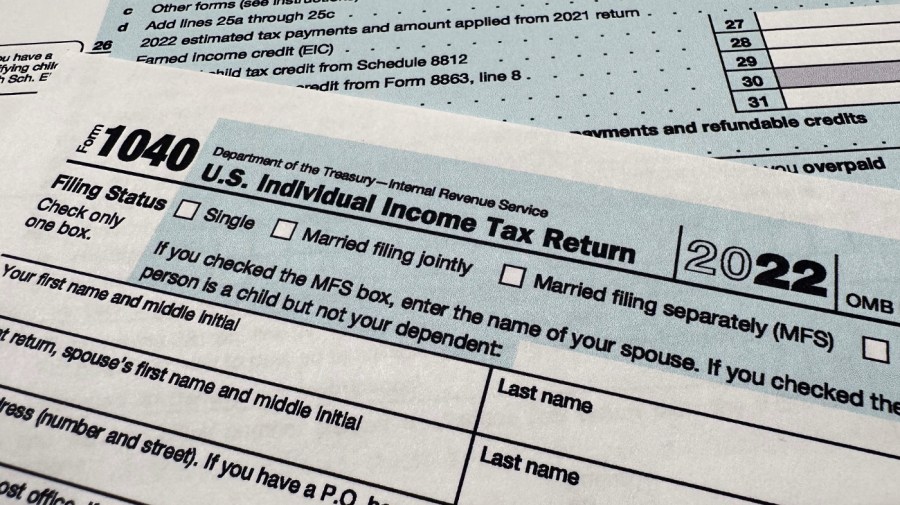Fixing the U.S. government’s finances has rightfully become one of the most critical tasks in politics today. The debt now exceeds $36 trillion, more than the combined debt of over 170 other countries around the world.
Millions see Elon Musk and Vivek Ramaswamy as governmental messianic saviors, prepared to tackle the entrenched bureaucratic failures of the system. Their proposals have included cutting $2 trillion in spending and providing free tax-filing software. They have captured America’s attention.
Yet, they overlook one of the most defining systemic failures of our generation: The United States loses an astonishing $1 trillion each year in taxes owed but unpaid, known as the “tax gap.” While the causes of this crisis — errors, underreporting, and outright evasion — are complex, the solution may not be.
I founded Truetax, a technology platform that’s key focus is to close the tax gap. I realized artificial intelligence offers transformative tools to modernize and simplify the tax system, making compliance easier, reducing errors and recovering lost revenue.
This crisis has undermined our country’s financial stability. The tax gap in the U.S. is bigger than in nearly every other developed nation. In Denmark, the tax gap is less than 2 percent of revenue. In the U.S., it nears a staggering 20 percent.
This disparity is not only damaging; it’s avoidable. Closing the tax gap would not only fund the entire annual interest on the U.S. debt, but would allow for tax cuts to all Americans. AI-powered solutions can be pivotal in making this happen.
At the root of this crisis is our tax system: Well over 100,000 pages of incomprehensible tax code. Complexity isn’t just a burden — it’s a systemic flaw. Compounding this chaotic foundation is the IRS’s reliance on an archaic technology platform built in the1960s. This outdated infrastructure has fostered inefficiency, errors, and exploitation – leaving the U.S. as a global outlier.
In Sweden, taxes can be filed in less than five minutes; in the U.S., months. The combination of complexity and technological failures has led millions — including myself — to unintentionally file erroneous tax returns, only to discover years later that we owe back taxes and heavy fines.
The IRS’s current approach is misdirected. Though the $60 billion funding boost from the Inflation Reduction Act has brought some modernization, much of it has been spent on hiring personnel rather than investing in transformative technology.
Efforts to recruit significantly more revenue agents to audit the wealthy may sound ambitious, but over half of these audits historically have resulted in no changes — and each cost upwards of $100,000. It’s an inefficient, outdated strategy.
Closing the tax gap requires a tech-first approach, with human intervention focused on the most complex cases.
First, taxpayer support needs to be simplified. Much greater emphasis needs to be placed on driving system automation,such as AI-powered call centers, which could provide help on complex tax sues in advance of filing, reducing errors and misunderstandings. This would streamline the multi-billion-dollar taxpayer assistance efforts and improve compliance without bloating the agency.
Second, real-time error prevention is critical. Technology can auto-fill forms, flag inconsistencies and detect underreporting as taxpayers file, adapting to evolving regulations and individual histories. A Harvard-led research project demonstrated that early interventions and the perception of robust oversight deter tax evasion far more effectively than post-filing enforcement.
Finally, audit automation is a massive area of opportunity. A 2021 McKinsey report estimated that up to 30 percent of audits could be automated — a number that has grown significantly with advancements in AI. Automating simpler cases would free up resources for complex audits, saving billions annually while recovering tens of billions in revenue.
Tax agency AI strategies like these are not just theoretical — they have been proven across many developed nations,including Spain and France. By fully embracing similar technologies, the United States could make huge progress in closing the tax gap and recovering a big portion of the $1 trillion lost annually.
Ninety-three percent of Americans agree that paying taxes is a civic duty. In today’s hyperpolarized environment, few issues unite the country like this. Closing the tax gap by modernizing the IRS isn’t just a financial imperative, it’s an opportunity to restore trust in our institutions.
What we need is clear: a tax system aligned with Musk and Ramaswamy’s vision for the Department of Government Efficiency (“DOGE”), one that cuts bureaucracy, ensures fairness and reflects our nation’s values.
Josh Sandler is the founder of Truetax and has built two venture-backed tech companies addressing large-scale systemic/economic challenges.

